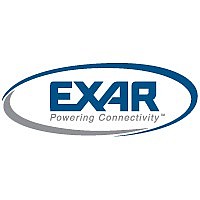xr17v254 Exar Corporation, xr17v254 Datasheet - Page 50

xr17v254
Manufacturer Part Number
xr17v254
Description
66mhz Pci Bus Quad Uart With Power Management Support
Manufacturer
Exar Corporation
Datasheet
1.XR17V254.pdf
(70 pages)
Available stocks
Company
Part Number
Manufacturer
Quantity
Price
Company:
Part Number:
xr17v254IV-F
Manufacturer:
Exar Corporation
Quantity:
10 000
Part Number:
xr17v254IV-F
Manufacturer:
EXAR/艾科嘉
Quantity:
20 000
XR17V254
66MHZ PCI BUS QUAD UART WITH POWER MANAGEMENT SUPPORT
MSR[6]: RI Input Status
Normally this bit is the complement of the RI# input. In the loopback mode this bit is equivalent to bit [2] in the
MCR register. The RI# input may be used as a general purpose input when the modem interface is not used.
MSR[5]: DSR Input Status
DSR# pin may function as automatic hardware flow control signal input if it is enabled and selected by Auto
CTS/DSR bit (EFR bit [6]=1) and RTS/DTR flow control select bit (MCR bit [2]=1). Auto CTS/DSR flow control
allows starting and stopping of local data transmissions based on the modem DSR# signal. A HIGH on the
DSR# pin will stop UART transmitter as soon as the current character has finished transmission, and a LOW
will resume data transmission. Normally MSR bit [5] is the complement of the DSR# input. However in the
loopback mode, this bit is equivalent to the DTR# bit in the MCR register. The DSR# input may be used as a
general purpose input when the modem interface is not used.
MSR[4]: CTS Input Status
CTS# pin may function as automatic hardware flow control signal input if it is enabled and selected by Auto
CTS/DSR bit (EFR bit [6]=1) and RTS/DTR flow control select bit (MCR bit [2]=0). Auto CTS/DSR flow control
allows starting and stopping of local data transmissions based on the modem CTS# signal. A HIGH on the
CTS# pin will stop UART transmitter as soon as the current character has finished transmission, and a LOW
will resume data transmission. Normally MSR bit [4] is the complement of the CTS# input. However in the
loopback mode, this bit is equivalent to the RTS# bit in the MCR register. The CTS# input may be used as a
general purpose input when the modem interface is not used.
MSR[3]: Delta CD# Input Flag
•
•
MSR[2]: Delta RI# Input Flag
•
•
MSR[1]: Delta DSR# Input Flag
•
•
MSR[0]: Delta CTS# Input Flag
•
•
The upper four bits [7:4] of this register set the delay in number of bits time for the auto RS-485 turn around
from transmit to receive.
MSR [7:4]: Auto RS485 Turn-Around Delay (requires EFR bit [4]=1)
When Auto RS485 feature is enabled (FCTR bit [5]=1) and RTS# output is connected to the enable input of a
RS-485 transceiver. These 4 bits select from 0 to 15 bit-time delay after the end of the last stop-bit of the last
transmitted character. This delay controls when to change the state of RTS# output. This delay is very useful in
long-cable networks.
5.11
Logic 0 = No change on CD# input (default).
Logic 1 = Indicates that the CD# input has changed state since the last time it was monitored. A modem
status interrupt will be generated if MSR interrupt is enabled (IER bit [3]).
Logic 0 = No change on RI# input (default).
Logic 1 = The RI# input has changed from a LOW to a HIGH, ending of the ringing signal. A modem status
interrupt will be generated if MSR interrupt is enabled (IER bit [3]).
Logic 0 = No change on DSR# input (default).
Logic 1 = The DSR# input has changed state since the last time it was monitored. A modem status interrupt
will be generated if MSR interrupt is enabled (IER bit [3]).
Logic 0 = No change on CTS# input (default).
Logic 1 = The CTS# input has changed state since the last time it was monitored. A modem status interrupt
will be generated if MSR interrupt is enabled (IER bit [3]).
Modem Status Register (MSR) - Write Only
Table 18
shows the selection. The bits are enabled by EFR bit [4].
50
REV. 1.0.0












